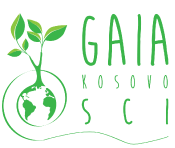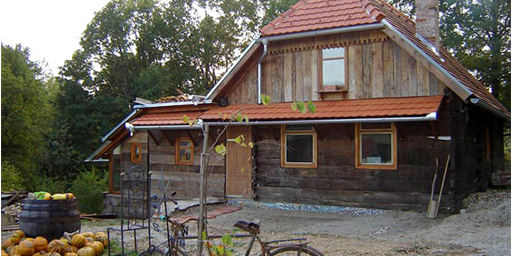GAIA Kosovo and ZMAG Croatia (Green Network of Activist Groups) are inviting you to apply for PDC course which will take place in Croatia, in Recycled Estate from 18th till 29th of October. This PDC is part of 3peas – Permaculture as a path to peace project supported by Erasmus+ program of the EU and is open only for members of the organizations who are partners in this project.
| Organization | Number of participants | Max travel reimbursment (EUR) |
| SCI Italy | 2 | 180 |
| SCI Catalunya | 2 | 275 |
| PVN Albania | 2 | 275 |
| CID Macedonia | 2 | 275 |
| VCV Serbia | 2 | 180 |
| VUK Croatia | 1 | 180 |
| CVS Bulgaria | 2 | 275 |
| Bugday Turkey | 1 | 275 |
| SCI Hellas | 1 | 275 |
| SCI France | 2 | 275 |
| SCI Germany | 1 | 275 |
| Utilapu Hungary | 2 | 180 |
| Nešto Više Bosnia and Herzegovina | 2 | 180 |
| GAIA Kosovo | 2 | 275 |
Participation fee for this PDC will be 60 € for program countries and 40 € for Western Balkans (Albania, Kosovo, Serbia, Bosnia and Herzegovina).
WHAT IS PERMACULTURE?

“Permaculture is a philosophy of working with, rather than against nature; of protracted & thoughtful observation rather than protracted & thoughtless labour; of looking at plants & animals in all their functions, rather than treating any area as a single-product system.”
Bill Mollison
Permaculture was created in the 1970’s by Bill Mollison, an Australian ecologist and University of Tasmania professor. He had spent many years out in nature as a wildlife biologist observing how natural systems work and became very distressed at the destruction that he saw going on around him. He decided that instead of being angry about what was happening and reacting against the destruction he wanted to work on creating a positive solution And he thought the solution would be living based on the patterns he had observed in nature.
Permaculture integrates land, resources, people and the environment through mutually beneficial synergies – imitating the no waste, closed loop systems seen in diverse natural systems. Permaculture studies and applies holistic solutions that are applicable in rural and urban contexts at any scale. It is a multidisciplinary toolbox including agriculture, water harvesting and hydrology, energy, natural building, forestry, waste management, animal systems, aquaculture, appropriate technology, economics and community development.
WHAT IS PDC?
Permaculture Design Certificate course is a 72 hour training experience. Participants who complete the full curriculum earn the internationally recognized Permaculture Design Certificate :). It provides an introduction to permaculture design as set forth by the movement’s co-founder Bill Mollison.
The course covers sustainable living systems for a wide variety of landscapes and climates. It includes the application of permaculture principles to food production, home design & construction, energy conservation and generation, and explores the social and economic structures that support a culture that cares for the planet and all its inhabitants.
The main topics of this PDC will be the following:
- the state of society and the environment, and what is permaculture
- permaculture ethics and principles
- soil analysis and soil quality improvement, composting, composting teas, malching
- reading landscapes, plant communities and succession
- growing of food in permaculture – gardening, farms, forest gardens, animals
- water – water in the landscape, water collection, purification and recycling of wastewater
- energy in Permaculture – efficiency and simple passive technology, and renewable solutions (sun, wind, biomass …)
- sustainable construction – efficient construction of natural materials
- urban permaculture – how to maximize the use of small farms for growing food in the city
- society and community – sustainable communities, participatory decisions, alternative and solidarity economies, Transition Movement
- permaculture design techniques
- practical design exercise – the last three days of the course, the participants create a permaculture design for the projects of their choice
an example of permaculture design

WHO SHOULD APPLY FOR THIS PDC?
- active members of partner organizations or their local groups,
- very interested in permaculture, but
- also very interested in building of just and fair society and non-formal education,
- motivated to organize follow up activities within SCI programs (workcamps, workshops, training, etc),
- ready to get out of the comfort zone, to share living space with 24 other people,
- ready and willing to share daily tasks for house maintaining, cleaning and so forth,
- ready to travel by environmentally friendly means of transport and to eat environmentally friendly food for 12 days without complaining
– vegan and vegetarian,
- not interested in just another training course, travel to Croatia, having just another point in CV and similar.
This is a serious thing :), therefore, we are expecting from participants to get prepared, to get into the world of permaculture, to practice and share permaculture after the course…
HOW TO APPLY?
Application form should be sent to gaia.kosovo@gmail.com and your sending organization (check which are the eligible countries for the course) no later than 20th of September 2017. GAIA Kosovo and the sending organization will select participants, who will be informed about the selection results by 25th of September.
Important practical notes:
- participants are expected to arrive on 17th in the afternoon and depart on 30th in the morning,
- there is participation fee (see above) and maximum amount for travel reimbursements,
- visa costs will be reimbursed fully,
- travel should be done by environmentally friendly means, if possible.
VENUE & HOSTS

The Course will take place in Recycled Estate, educational center run by Green Network of Activist Groups (GNAG) or Zelena Mreza Aktivistickih Grupa (ZMAG) in Croatia. The Recycled Estate is situated in Vukomeric, 24 kilometers south of Zagreb. As the main location of the organization it is both a place to live and to work, that serves as a practical and experimental site for promotion and dissemination of environmental knowledge and skills based on permaculture ethics and design. It is also their office and there is a library in the house that is educational center.
Recycled Estate began life more than a decade ago when young environmental activists from Zagreb purchased land in Vukomerič and were donated an old wooden house that they were able to dismantle, transport and reconstruct on their newly-acquired property. This structure now houses a kitchen, sleeping quarters for volunteers and a library, and acts as the main eco-centre building for the provision of sustainability education. The eco-centre is a classic example of “learning by doing” as the original founders had to learn everything from scratch, from how to build and maintain buildings, how to insulate structures with sustainable products, to how to install renewable energy sources and constructing ecological waste management systems. This manner of acquiring knowledge has made it much easier to transfer permaculture knowledge to others. These days the eco-centre focuses, among others, on natural cosmetics, building and installing solar collectors and “food serenity”. The centre also features a children’s playground intended to trigger curiosity about the environment among children.
GAIA Kosovo was born in 2010 from Spring workcamp, which was organized by VCV Serbia and BSF Kosova in Plemetina Learning Center for Roma children, with the idea to become SCI branch in Kosovo. Since 2014 GAIA is full member of Service Civil International (SCI), which is a volunteer peace organisation dedicated to promoting a culture of peace by organizing international voluntary projects for people of all ages and backgrounds. GAIA is dedicated to culture of peace, social and environmental justice, as well as promotion of cultural diversity and through education and integration of marginalized and minority groups in Kosovo society. The main activities of GAIA are volunteering programs, non-formal educational programs, festivals and promotion of solidarity and understanding in Kosovo and the Balkans.
More on ZMAG: www.zmag.hr
More on GAIA: www.gaiakosovo.org
More on SCI: www.sci.ngo
For more information, you can contact us via e-mail: gaia.kosovo@gmail.com






